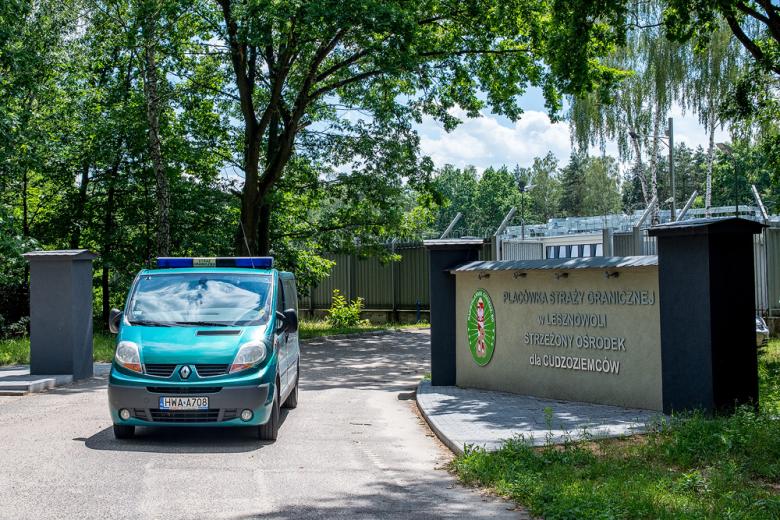Keep our news free from ads and paywalls by making a donation to support our work!

Notes from Poland is run by a small editorial team and is published by an independent, non-profit foundation that is funded through donations from our readers. We cannot do what we do without your support.
The office of Poland’s human rights commissioner (RPO) has raised concern that the country’s guarded centres for foreigners – where people awaiting asylum or deportation decisions are housed – are at risk of overcrowding and that conditions may violate international standards.
In a letter to the interior ministry, the RPO’s office warned that the situation “poses a real threat to the safety of foreigners”.
Strzeżone ośrodki dla cudzoziemców są bliskie przeludnieniu – zwraca uwagę zastępca #RPO Adam #Krzywoń w piśmie do MSWiA.
Zaniepokojenie budzi próba rozwiązania problemu poprzez systematyczne dokwaterowywanie kolejnych osób aż do osiągnięcia minimalnej powierzchni 2 m kw na… pic.twitter.com/E7CAQX45Do— Biuro Rzecznika Praw Obywatelskich (@BiuroRPO) September 8, 2025
Poland has in recent years experienced a surge in the number of asylum requests, while the current government has also moved to increase deportations of immigrants who violate Polish laws.
The RPO’s office began reviewing occupancy data after receiving reports of potential overcrowding at the guarded centres. It found that many of them were close to full capacity.
Under current regulations, if vacancies are unavailable, foreigners may be housed in rooms smaller than four square metres per person, but not below two square metres, for a maximum of 12 months.
The RPO’s office highlighted that the current minimum space requirement of two square metres is lower than both international detention standards and Poland’s own standard of three square metres per person in remand centres and prisons.
The commissioner’s office also cited a 2011 Supreme Court resolution stating that placement of a detainee in a cell with less than three square metres per person may constitute a violation of personal rights.
It emphasised that foreigners in guarded centres or detention facilities are not serving prison sentences and should not face less favourable conditions than such inmates.
The letter also pointed to a 2022 report by the National Mechanism for the Prevention of Torture (NPMT), an independent state body, which noted “systemic problems” with living conditions in administrative detention during the migration crisis on the Belarus border that erupted in mid-2021.
In his letter, deputy human rights commissioner Adam Krzywoń asked the interior ministry to clarify whether there are ongoing efforts to amend current regulations, or if there are plans to construct new centres or expand existing facilities.
Around 100 people – mostly from Iraq – detained after crossing into Poland from Belarus have held a hunger protest, demanding to be released from their holding centre.
Poland’s deputy commissioner for human rights says conditions there are “unacceptable” https://t.co/44Sk6pJciD
— Notes from Poland 🇵🇱 (@notesfrompoland) February 10, 2022
Since 2021, tens of thousands of migrants and asylum seekers – mainly from the Middle East, Asia and Africa – have tried to enter Poland from Belarus, with the encouragement and assistance of the Belarusian authorities.
Last year, the number of asylum requests rose to 15,000, 72% more than in 2023 and the highest annual figure recorded by the Polish border guard, whose data go back to 2016.
In response, Poland has heavily fortified its eastern border with physical barriers and electronic monitoring. The government also banned asylum claims by people crossing from Belarus.
Earlier this year, the government also vowed tougher measures against migrant crime, with officials pledging mass arrests and deportations. Police and border guards soon carried out sweeping operations, detaining around 1,500 foreigners in February, with hundreds facing expulsion.
Poland wants to deport 57 Ukrainians and six Belarusians involved in criminal behaviour at a concert in Warsaw on Saturday.
Meanwhile, a Ukrainian seen at the event holding a nationalist flag associated with the massacre of Poles during WW2 has apologisedhttps://t.co/aVKmaearVG
— Notes from Poland 🇵🇱 (@notesfrompoland) August 12, 2025

Notes from Poland is run by a small editorial team and published by an independent, non-profit foundation that is funded through donations from our readers. We cannot do what we do without your support.
Main image credit: Nadwiślański Oddział Straży Granicznej

Alicja Ptak is deputy editor-in-chief of Notes from Poland and a multimedia journalist. She has written for Clean Energy Wire and The Times, and she hosts her own podcast, The Warsaw Wire, on Poland’s economy and energy sector. She previously worked for Reuters.



















